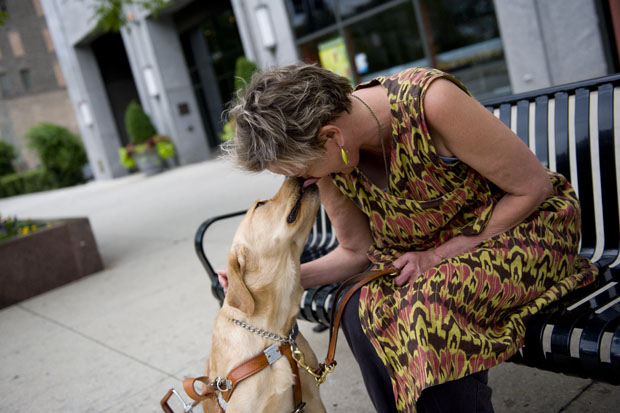How one blind woman sees race
By Beth Finke

How one blind woman sees race
By Beth Finke
I lost my sight when I was 26 years old. I didn’t see the planes go into the Twin Towers. I have never seen Barack Obama. Mitt Romney, either, come to think of it.
Blindness doesn’t bring a whole lot of advantages. So I relish the ones I have.
I walk arm in arm with people all the time. My dog goes with me everywhere. And when friends drive me somewhere? We park in handicapped parking!
Best of all, I can’t judge people by the way they look. Fat, skinny, beautiful, homely, young, old, white, black – it’s all the same to me.
Without being able to see them, I’m left to judge people “not by the color of their skin, but by the content of their character.”
From what I’m told, my friends these days have many different skin colors. I don’t always realize this when I first meet them.
When we were living in Champaign, in central Illinois, it could be hard to get out of the bubble. A friend invited us to a party there once and insisted that if we knew anyone new, we better bring them along to give the party some punch. We’d known David and Audrey for a year by then, and when I suggested we invite them to come, my husband agreed and said, “They’d be happy to have some black people there.”
I was stunned. “David and Audrey are black?” By then I’d met David’s mom, gone to book readings with the two of them, had dinner at their house. It never occurred to me to think about what color their skin was.
We moved to Chicago in 2003. More people, more backgrounds, more colors. I clung to my naïveté. A friend invited me to join her book club, and I participated for months before discovering I was the only one who wasn’t Jewish.
In those early months in Chicago I would show up at the health club, say hi to Rich behind the desk, grab my locker key.
A year passed before I found out there were two different men named Rich working there. I thought it was always the same guy.
Baseball season cleared this up. Rich would walk me over to the lap pool and we’d talk about his favorite team, the Twins. The next day he’d settle my seeing eye dog behind the desk and marvel about the pitching staff on his favorite team, the White Sox. They both laughed when I confessed my confusion. Baseball wasn’t the only thing differentiating these two. The Twins fan was single and in his 20s. The Sox fan was married, had a few kids, and was in his thirties. Twins fan was white, Sox fan was black.
Twin fan Rich left years ago for a job in the theatre. Sox fan Rich stayed on at the club.
None of us knew that Sox fan Rich had been one of the thousands of African-Americans who had taken the Chicago Fire Department’s entrance exam in 1995. He passed all the requirements, but because of the way the exam was scored, he and most of the other African-Americans were passed over for the fire department jobs. Now, thanks to a court ruling on a massive class action lawsuit, Rich has left the health club to train to become a firefighter. As much as we all miss him at the club, it sure feels good to know that someone as fit, caring, kind and smart as Rich will soon be someone we can count on at the Chicago Fire Department.
I don’t hear people discussing race when I eavesdrop at coffee shops. I don’t feel racism in the streets I’m on. Even when people tell me what color they are, it can be hard to remember. I lose track.
Blindness did not leave me thoughtless, though. I listen to the radio. My talking computer reads newspapers out loud. I know about that boy who was shot and killed in Sanford, Florida. But unless something happens to someone near me, like Rich, I don’t always, well, see it.
People work a lifetime to overcome visual prejudices, and while I’m not always sure blindness has given me an advantage, I try to use it as a handicap. I like to think I’m ahead of the race.
Beth Finke is a Chicago writer and the author of the memoir Long Time, No See and the children’s book Safe and Sound.